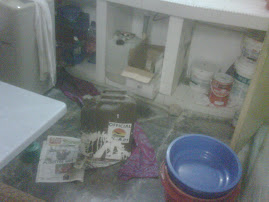HO HUP is confident of getting the support of shareholders for their revised regularisation plan which they feel is the best way to get the company out of its current PN17 status and look towards reviving the company and the business.
The company is proposing a 60 per cent ‘haircut’ as opposed to the 95 per cent ‘haircut’ proposed earlier on June 24, 2009.
Going by their application to Bursa seeking an extension of three months to submit a revised plan taking into consideration additional factor, its managing director Lim Ching Choy, said the proposed reduction of the existing issued and paid-up share capital of the company by RM0.60 of the par value would result in a share consolidation on the basis of five ordinary shares of RM0.40 each into two shares has also been proposed.
“The present board had also proposed a placement of approximately 10 million news shares at an issue price of RM1.00 each and the identities of the placees will be disclosed to shareholders together with a full announcement on the proposed revised scheme, said Lim a statement released today.
The scheme will also see a proposed renounceable rights issue of up to approximately 30 million new shares at an issue price of RM1.00 per revised rights share.
“We are protecting the interests of minority shareholders and we know for a fact that they have been with this company for a long time and appreciate their loyalty and faith in the Ho Hup branding,” added Lim in an apparent response to a reaction by former managing director Dato Low Tuck Choy who was reported saying that he believed that what the current management was proposing was not in the best interests of minority shareholders.
Tuck Choy, through his family’s Low Chee & Sons Sdn Bhd’s holding and other direct stakes, controls about 27% of Ho Hup shares.
He had called for an EGM on Feb 4 to remove seven of eight existing Ho Hup directors, including executive deputy chairman Datuk Vincent Lye and managing director Lim Ching Choy.
Tuck Choy is not offering himself to be re-elected, but had proposed six appointees whom he described as “good, capable and experienced candidates” as replacements.
He said his younger brother, currently Ho Hup non-executive director Low Teik Kein, would remain on board as Low Chee & Sons’ representative.
However Lim said the present state of affairs of Ho Hup was very much due to mismanagement during the tenure of Datuk Low from 1994 till 2008.
“At the time of his exit the share price was at RM0.30 and it was based on that share price that a bigger capital reduction of 95 per cent was initially proposed.
“But the share price had since improved indicating that shareholders have gained confidence in the present management in reviving this 50–year old company that was declared a PN17 company with Bursa in July of 2008.”
Explaining the regularization plan further, Lim said the lower capital reduction this time round comes with the option to leverage on the company’s current 60-acre land bank which they have earmarked to develop Jalil Green City.
This will see a proposed reduction of the existing issued and paid-up share capital of the company by RM0.60 of the par value. A share consolidation on the basis of five ordinary shares of RM0.40 each into two shares has also been proposed.
This would mean that it would either be a 60 per cent capital reduction with the said parameters or a core land bank transaction in the event the proposed revised capital reconstruction is unsuccessful.
This means that the shareholders on Feb 4 will have two options and can vote either vote for the capital reduction or vote for the company to leverage on its core land bank to address the accumulated losses of the Ho Hup Group with certainty in Lim’s plan to bail out Ho Hup.
Lim’s two-pronged approach comes with a back-up plan in which the land bank transaction can be with arrangements to jointly develop the core land bank where the company can either enter into an option to secure buyers for the development projects within the land bank or a combination of the two.
“In essence, the new plan will see a lower amount of restricted shares indicatively to 10 million and a higher quantum of rights shares to indicatively 30 million shares.
Lim also refutes the possibility of a new substantial shareholder coming in with the proposed capital reduction with the rights and shares’ sale and he has clarified that the proposed private placement will be placed to both strategic and non-strategic investors.
“The selection criteria will take into consideration that they must add value to the operations of the Group and this can be done only if the investor understands or is familiar with Ho Hup’s business of property development and construction business and above all the financial viability of the projects.
The surge in the share price was among the key factors that had prompted Lim’s team to rethink their capital reduction footing and deciding on a 60 per cent ‘haircut’ as opposed to the earlier 95 per cent.
Nonetheless Lim continues to be firm with the fact that all the existing shareholders will remain as shareholders, assuming they subscribe, and the details of the proposed private placement will be made known by the board.
Lim has also assured that none of the placees are going to be parties related to the current major shareholders or Ho Hup directors.
On Dato Low’s alternative plan, Lim said that it would not fulfill the basic fundamental requirements for the upliftment of the PN17 status of Ho Hup.
Dato Low had claimed that a regularisation could be done without a capital reduction and had proposed an alternate plan which called for a renounceable one-for-one rights issue of 25.5 million irredeemable convertible preference shares (ICPS) with two warrants for each ICPS subscribed.
Lim said that this was because the amount of funding to be raised (RM25.5 million) is insufficient for Ho Hup’s debt management and working capital especially for the development of the 60 acres.
Moreover Lim feels that there is no guarantee that the free warrants will be exercised in the near future and hence has deemed the cash flow of RM51 million arising from such an exercise, as highly uncertain. This means that with insufficient funding, uncertainties will continue to plague Ho Hup’s continued operations as a growing concern as its current potential renders the company to remain as a PN17 company. This is bearing in mind that the Group had recently secured a loan for RM125 million to refinance its current loan to CIMB and can risk the foreclosure of its land bank in the absence of alternative funding.
Lim is also of the opinion that since any restructuring of a PN17 company has to ensure that the shareholders’ equity has to be more than 25 per cent of the share capital or the shareholders’ capital has to be RM40 million or more, Low’s alternative plan will not be able to fulfill such an obligation.
On Dato Low’s stand that he had asked to be served, Lim said that investigations by the authorities and the police were on-going since police reports have been lodged and a legal suit had been filed against Dato Low for RM250 million.
The company went under accumulating looses amounting to RM270 million over the 14 years of his tenure and we are very much focused on not only reviving the company but moving forward with new businesses as shareholders want returns on their investments.
We have tried to engage Dato Low on several occasions for discussions and had even written to him but he did not respond except for his statements reported by the media.
Subscribe to:
Post Comments (Atom)
.jpg)
.jpg)





























No comments:
Post a Comment